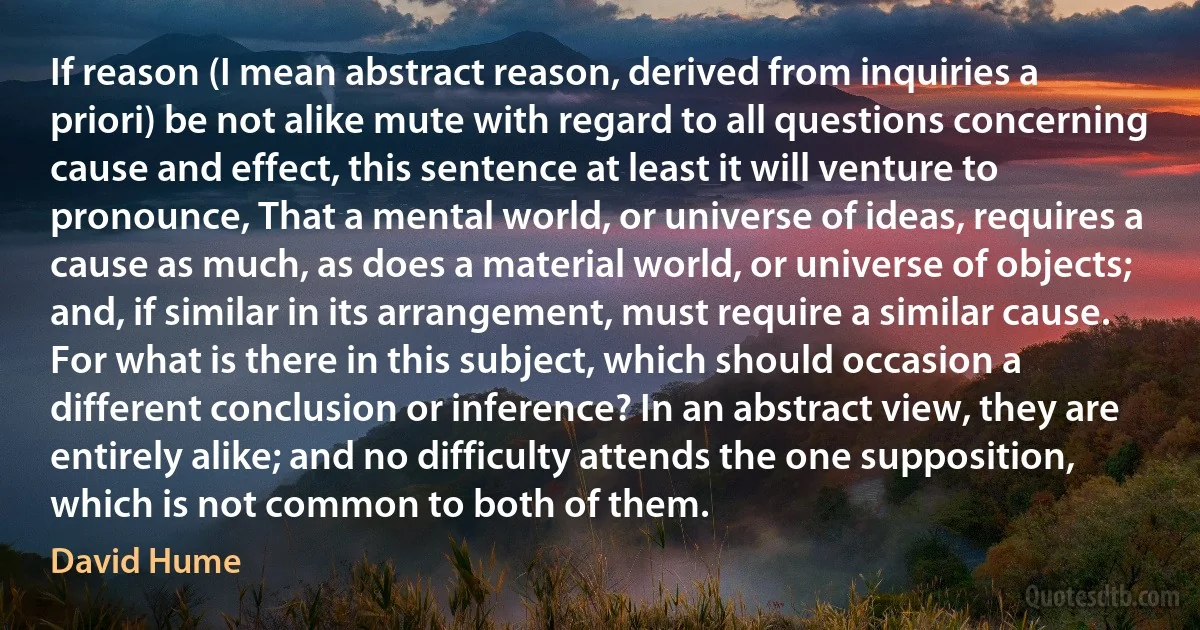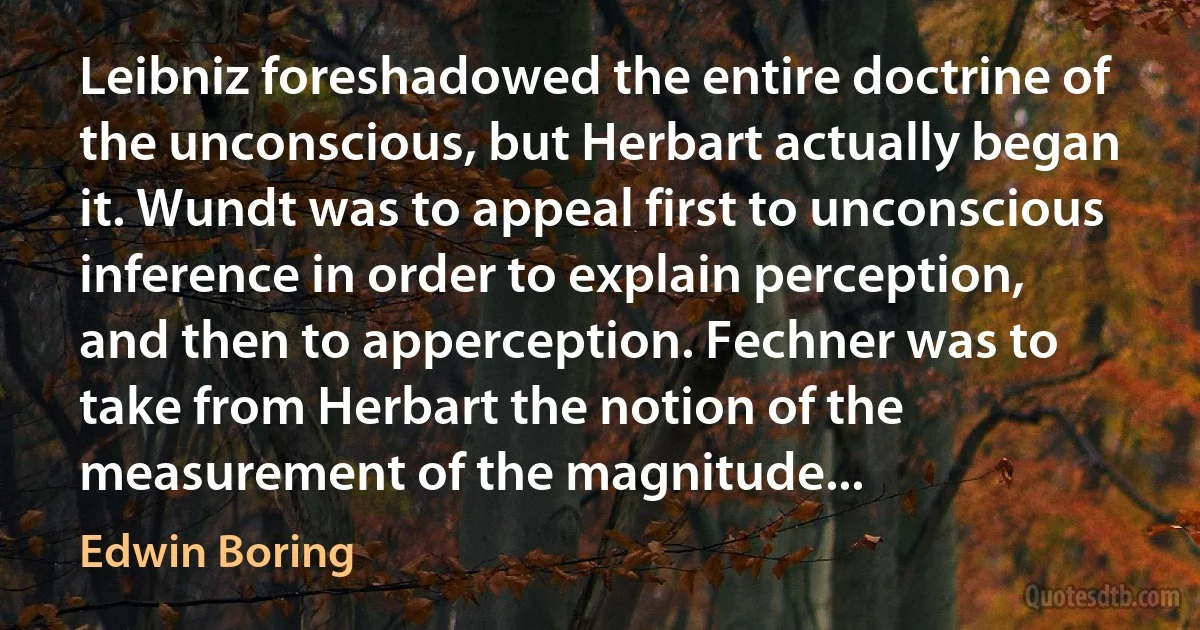Inference Quotes - page 2
Is it not proven beyond all dispute that there is no limit to the enormities which men will commit when they are once persuaded that they are keepers of other men's consciences? To spread religion by any means, and to crush heresy by all means is the practical inference from the doctrine that one man may control another's religion. Given the duty of a state to foster some one form of faith, and by the sure inductions of our nature slowly but certainly persecution will occur. To prevent for ever the possibility of Papists roasting Protestants, Anglicans hanging Romish priests, and Puritans flogging Quakers, let every form of state-churchism be utterly abolished, and the remembrance of the long curse which it has cast upon the world be blotted out for ever.

Charles Spurgeon
In the interior of the atom, Bohr had tried the plan of retaining the particle-electron and modifying the classical mechanics. Heisenberg took the opposite course, his procedure amounting in effect to retaining the classical mechanics, at least in form, and modifying the electron. Actually, the electron dropped out all together, because it exists only as a matter of inference and not of direct observation. For the same reason, the new theory contains no mention of atoms, nuclei, protons, or of electricity in any shape or form. The existences of all these are matters of inference, and Heisenberg's purely mathematical theory could no more make contact with them than with the efficiency of a turbine or with the price of wheat.

James Jeans
If an event really happened which was not a part of the uniformity of nature, it would have two properties: no evidence could give the right to believe it to any except those whose actual experience it was; and no inference worthy of belief could be founded upon it at all.
Are we then bound to believe that nature is absolutely and universally uniform? Certainly not; we have no right to believe anything of this kind. The rule only tells us that in forming beliefs which go beyond our experience, we may make the assumption that nature is practically uniform so far as we are concerned. Within the range of human action and verification, we may form, by help of this assumption, actual beliefs; beyond it, only those hypotheses which serve for the more accurate asking of questions.

William Kingdon Clifford
There is ... no first person plural to the verb "cogito." Observation, verification, and inference are functions which are perfected only in their independent individual exercise. I am not unmindful of the importance of the corroboration of one mind by another; but such corroboration is valuable only in so far as both minds have reached their results alone. Corroboration implies the absence of collusion. The devotee of the intellect must, then, have the strength to work alone.

Ralph Barton Perry
Trade has passed out of the hands of British merchants, and into the hands of the Greeks, Swiss, or Germans, all belonging to countries that have no navy to protect them at all. This is the fact; and what is the inference? It may be that English merchants are not educated sufficiently in foreign languages. But it may be also that Englishmen carry with them their haughty and inflexible demeanour into their intercourse with the natives of other countries. The noble Lord [Palmerston] inscribes "Civis Romanus sum" on our passports, which may be a very good thing to guard us in our footsteps. But "Civis Romanus sum" is not a very attractive motto to put over the door of our counting-houses abroad.

Richard Cobden
I found her charming, went home and thought no more about her. Or, I thought I would think no more about her. But in the following days and nights her image remained obsessively before my eyes. My appetite fell off and I began sleeping badly. My computer checked out the relevant data and told me that I might conceivably be having a nervous breakdown; but the strongest inference was that I was in love.

Robert Sheckley
The term fuzzy logic is used in this paper to describe an imprecise logical system, FL, in which the truth-values are fuzzy subsets of the unit interval with linguistic labels such as true, false, not true, very true, quite true, not very true and not very fake, etc.... As a consequence, the truth tables and the rules of inference in fuzzy logic are (i) inexact and (ii) dependent on the meaning associated with the primary truth-value true as well as the modifiers very quite.

George Klir
That there is a common cause, an that it is either what we call material progress or something closely connected with material progress, becomes more than an inference when it is noted that the phenomena we class together and speak of as industrial depression are but intensifications of phenomena which always accompany material progress, and which show themselves more clearly and strongly as material progress goes on. Where the conditions to which material progress everywhere tends are the most fully realized-that is to say, where population is densest, wealth greatest, and the machinery of production and exchange most highly developed - we find the deepest poverty, the sharpest struggle for existence, and the most of enforced idleness.

Henry George
If the whole of natural theology, as some people seem to maintain, resolves itself into one simple, though somewhat ambiguous, at least undefined proposition, that the cause or causes of order in the universe probably bear some remote analogy to human intelligence: If this proposition be not capable of extension, variation, or more particular explication: If it affords no inference that affects human life, or can be the source of any action or forbearance: And if the analogy, imperfect as it is, can be carried no farther than to the human intelligence, and cannot be transferred, with any appearance of probability, to the other qualities of the mind; if this really be the case, what can the most inquisitive, contemplative, and religious man do more than give a plain, philosophical assent to the proposition, as often as it occurs, and believe that the arguments on which it is established exceed the objections which lie against it?

David Hume
There is nothing in any object, consider'd in itself, which can afford us a reason for drawing a conclusion beyond it; [...] even after the observation of the frequent or constant conjunction of objects, we have no reason to draw any inference concerning any object beyond those of which we have had experience.

David Hume
Since most subjects studied in school consist largely of theories... language education must include not only the serious study of what truth and falsehood mean in the context of a subject, but also what is meant by a fact, an inference, an assumption, a judgment, a generalization... In this way students will be learning both the language of a subject and the methods of inquiry in that subject, since inquiry consists of nothing else but the generation of questions, the invention of definitions and metaphors, the separation of facts from inferences, the forming of generalizations...

Neil Postman
Truly, though kingship be not a title but a name of office that runs through the law, yet it is not so ratione nominis, but from what is signified. It is a name of office, plainly implying a Supreme Authority. Is it more, or can it be stretched to more? I say, it is a name of office, plainly implying the Supreme Authority, and if it be so, why then I would suppose, (I am not peremptory in any thing that is matter of deduction or inference of my own,) why then I should suppose that whatsoever name hath been or shall be the name, in which the Supreme Authority shall act; why, (I say) if it had been those four or five letters, or whatsoever else it had been, that signification goes to the thing. Certainly it does, and not to the name. Why then, there can be no more said, but this, why this hath been fixt, so it may have been unfixt.

Oliver Cromwell
The circumstances of the camping trip are multiply special: many features distinguish it from the circumstances of life in a modern society. One may therefore not infer, from the fact that camping trips of the sort that I have described are feasible and desirable, that society-wide socialism is equally feasible and equally desirable. There are too many major differences between the contexts for that inference to carry any conviction. What we urgently need to know is precisely what are the differences that matter, and how can socialists address them? Because of its contrasts with life in the large, the camping trip model serves well as a reference point for purported demonstrations that socialism across society is not feasible and/or desirable, since it seems eminently feasible and desirable on the trip.

Gerald Cohen
By feeling insecure about our making love, Nina, you make the inference that we are a pair of cheap people involved in some cheap pleasant friction. Pull on the pants and walk away, adding up the score. I think we're interested in each other, involved with each other, curious about each other. This was a part of exploring and learning. When it's good you learn something about yourself too. If the spirit is involved, if there is tenderness and respect and awareness of need, that's all the morality I care about.

John D. MacDonald
The existence of antagonistic "conspiracies" was recognized by the defenders of religious and political views. Iconoclasts knew that images might distort the basic message of their creed (which consisted of words and resided in Holy Books). Church architecture and church music were adapted to the needs of the Holy Faith. Alternative styles were either fought or made part of religious PR. I conclude that our 'field of experience' is molded, overlaid, and 'conspired' against not just by language, but by numerous other patterns and institutions, many of them in mutual conflict. An inference from a style, a particular linguistic apparatus, or, more recently, from scientific beliefs, to a cosmology, corresponding ways of life and an all-embracing "spirit of the age therefore needs special support; it cannot be made as a matter of course.

Paul Karl Feyerabend
The term fuzzy logic is used in this paper to describe an imprecise logical system, FL, in which the truth-values are fuzzy subsets of the unit interval with linguistic labels such as true, false, not true, very true, quite true, not very true and not very fake, etc.... As a consequence, the truth tables and the rules of inference in fuzzy logic are (i) inexact and (ii) dependent on the meaning associated with the primary truth-value true as well as the modifiers very quite.

Lotfi A. Zadeh
![[F]acts are valueless unless connected and explained by a correct theory; [...] analogies are very dangerous grounds of inference, unless carefully founded on similar conditions; [...] experience misleads if it be misinterpreted. (William Stanley Jevons)](https://cdn.quotesdtb.com/img/quotes_images_webp/75/william-stanley-jevons-correct-293875.webp)


